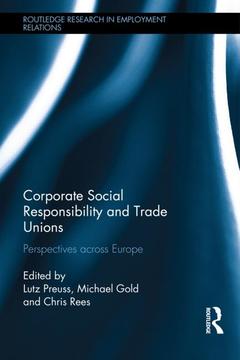Description
Corporate Social Responsibility and Trade Unions
Perspectives across Europe
Routledge Research in Employment Relations Series
Coordinators: Preuss Lutz, Gold Michael, Rees Chris
Language: English
Subjects for Corporate Social Responsibility and Trade Unions:
Keywords
corporate social responsibility; trade unions; europe; international business; employment relations; SACO; public policy; MNC Subsidiary; CSR Policy; National Business System; CSR Debate; Develop CSR Policy; CSR Issue; European Works Councils; Environmental Issues; CSR Discourse; CSR Practice; Union Respondents; CSR Forum; CSR Expertise; Global Union Federations; Trade Union Engagement; CSR Concept; CSR Tool; CSR Initiative; Civil Society; Business Case; Finnish Trade Unions; SME Supplier; IG Metall
Publication date: 10-2014
Support: Print on demand
Publication date: 12-2020
· 15.6x23.4 cm · Paperback
Description
/li>Contents
/li>Readership
/li>Biography
/li>
Growing interest in corporate social responsibility (CSR) has focused attention on the relationship between businesses and key stakeholders, such as NGOs and local communities. Curiously, however, commentators on CSR rarely discuss the role of trade unions, while commentators on employment relations seldom engage with CSR. This situation is all the more remarkable since unions are a critically important social actor and have traditionally played a prominent role in defending the interests of one key stakeholder in the company, the employee.
Written by dedicated experts in their field, this book addresses a key gap in the literature on both CSR and employment relations, namely trade union policies towards CSR, as well as union engagement with particular CSR initiatives and the challenges they face in doing so. The research covers eleven European countries which, when taken together, constitute a representative sample of industrial relations structures across the continent.
This book will be essential reading for scholars, students and practitioners of international business, employment relations, public policy and CSR. Its foreword is written by Philippe Pochet and Maria Jepsen, Directors of the European Trade Union Institute in Brussels.
Foreword 1. The Rise of Corporate Social Responsibility as a Challenge for Trade Unions2. Belgium: Unions questioning the added value of CSR3. Finland: Positive union engagement with CSR 4. France: State influence over union strategies on CSR 5. Germany: Binding agreements preferable to voluntary CSR6. Hungary: CSR between socialism and export-oriented MNCs7. Lithuania: CSR on a wish list 8. Poland: Much risk, little benefit in CSR 9. Slovenia: CSR as a luxury in tough economic times 10. Spain: An opportunity to improve working conditions through CSR 11. Sweden: CSR as non-union arena for union issues 12. United Kingdom: Scepticism and engagement in union positions on CSR 13. European Trade Unions and CSR: Common dilemmas, different responses
Lutz Preuss is Reader in Corporate Social Responsibility at the School of Management, Royal Holloway University of London, UK
Michael Gold is Professor of Comparative Employment Relations at the School of Management, Royal Holloway University of London, UK
Chris Rees is Professor of Employment Relations at the School of Management, Royal Holloway University of London, UK




